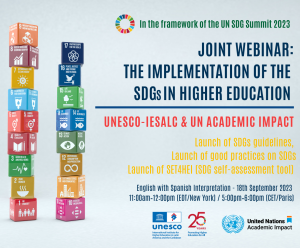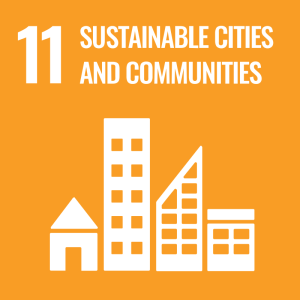¿Cómo contribuye su institución de educación superior al desarrollo sostenible?
SET4HEI (Herramienta de evaluación de la sostenibilidad para instituciones de educación superior, por sus siglas en inglés) es un recurso gratuito, en línea y abierto desarrollado por la UNESCO, que permite a las instituciones de educación superior identificar sus contribuciones a los 17 Objetivos de Desarrollo Sostenible (ODS) de las Naciones Unidas.
Esta es una iniciativa liderada por el Instituto Internacional de Educación Superior de la UNESCO en colaboración con otras agencias de las Naciones Unidas y expertos en educación superior de todo el mundo.
SET4HEI está disponible inglés y español. Las versiones en francés y árabe estarán disponibles a lo largo de 2024.
Más información sobre el evento de lanzamiento en la sección de noticias.
Haga clic en los ODS a continuación para ver cómo las IES pueden contribuir a cada uno de ellos y acceder a las evaluaciones correspondientes.
For example, they are key to train the next generation of social workers, development economists, civil servants in charge of social security and all other professionals who need to understand how economic exclusion affects and is affected by their area of work. Through their research, HEIs can contribute to measuring and better understanding poverty, and finding evidence-based solutions. Internally, HEIs must ensure that low-income students can effectively access and progress through higher education, removing economic barriers associated to tuition fees, learning materials, connectivity and the cost of living. Externally, HEIs can engage with disadvantaged local communities, offering free educational services or volunteering initiatives.

La certificación SET4HEI
Si es una institución de educación superior que destaca en la contribución a alguno de los ODS y le gustaría posicionarse como líder en impacto al desarrollo sostenible, la certificación SET4HEI es para usted.
Su desempeño en los ODS seleccionados será evaluado rigurosamente y validado externamente por pares y expertos en los campos respectivos en un proceso coordinado por la UNESCO. Solo las instituciones certificadas reciben una insignia digital de la UNESCO por cada ODS en el que sobresalen, además de comentarios sobre áreas de mejora. Este distintivo será una señal de prestigio sobre las actividades que realizan las IES en materia de desarrollo sostenible. Esta insignia puede integrarse en sitios web, correos electrónicos y materiales de comunicación.
Para más información haga clic aquí.




